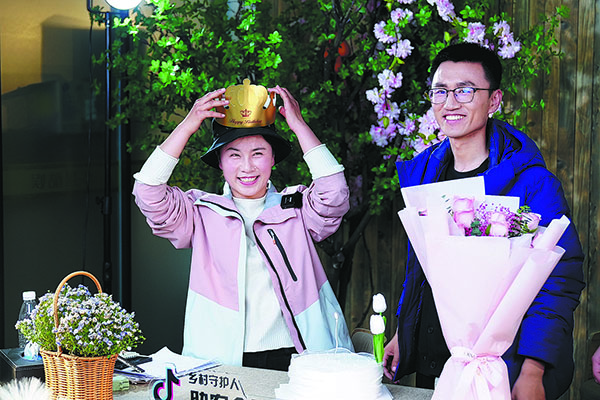Livestreamer turns 'failure' into a rural success story


Mu Sa, a livestream host of the Hui ethnic group from Zhongning, Ningxia Hui autonomous region, epitomizes how the internet has transformed many young unemployed people into useful talents contributing to society.
After graduating from the Lanzhou-based Northwest Minzu University majoring in sociology, Mu worked as an office clerk in Shanghai, a marketing assistant in Beijing and a data analyst in Hangzhou. Each time he struggled to realize his dream in big cities. However, Mu at last found that what touched him most was the "feathery tenderness" of homesickness, as he described it.
Mu returned home at 25 after losing his job during the COVID-19 pandemic in November 2021.
Depressed, Mu, who has moderate hearing impairment caused by a fever at the age of 10, thought of himself a "failure" at first. Leaving their village had been a goal for all rural children of his generation.
However, he was not deterred by his difficulties and quickly lifted himself up. Mu decided to pick up his cell phone and begin creating short videos about local people's daily lives at home and uploading them online.
A video clip showing his mother cooking local food turned out to be a surprise hit. Even his mother was shocked that so many viewers, who commented that the video evoked memories of their own moms and hometowns, could be interested in a daily routine.
Mu said it was the success of this video clip that inspired him to carry on. He gradually found that village-related content was popular among his followers. "The more local the content, the more universal its appeal is," he said.
Since then, his father, mother, elder sister, classmates, friends and neighbors, their small courtyards, chickens, sheep, and vast fields have all become the subjects of Mu's camera lens.
Many fans know about his hometown Dazhanchang and the lives of local residents in Northwest China through Mu's work.
Ma Rui, a middle school classmate of Mu's who works for a local media outlet, also posts about local life on his social media, which has 150,000 followers. He helps Mu with framing, composition, transitions and music.
Mu's unsmiling father, his mother who can make all kinds of tasty food and occasionally blurts out "golden sentences", and his capable sister have all become the stars of his videos.
As his work attracts more and more followers, Mu has started publishing short videos on an almost daily basis. He faithfully records the daily lives of those around him, and releases the video clips at 6 pm most days. Some people say his video clips are both sparse and detailed, giving people a quiet, poetic and idyllic feeling.
Mu started promoting local specialties on his account on April 1 last year after some followers asked him where they could buy the beef, lamb, fruit, tea and rice that had featured in some of his videos.
The sesame oil, wolfberries and tea he sold on his first day totaled a whopping 700,000 yuan ($95,764). For context, the average per capita disposal income of his hometown is about $10 a day.
The success was a big surprise. "I realized how powerful the internet is that day," said Mu. The popularity of local specialties consolidated his confidence that he could work as a "salesman" for the agricultural produce of not only his own family but more importantly his hometown.
With more than 5 million followers on social networking websites, Mu has become the No 1 "salesman" in Zhongning county, helping his fellow-villagers to sell local specialties online.
Nearly 90 percent of his fans are outside Ningxia. Many people said that it is through Mu's videos that they know about Ningxia.
Apart from his rural angle, Mu also attributes the popularity of his short videos to the empathetic effects they produce in the viewers, particularly young people.
"The uncertainty of the future often makes young people feel confused to varying degrees," he said. "I gave my answer to the confusion with my own practical actions: There is not a uniform norm of life for young people, including college graduates. Dreams will lead everyone to where they should go."
In January, Mu was invited to take part in a program at China Central Television in Beijing, introducing his business and life and promoting the farm produce of Ningxia.
This was the first time Mu had returned to Beijing since he left the capital in 2020. He brought his parents with him on the trip, which was their first time visiting the city.
Although he has millions of fans on social media, Mu felt nervous sitting in front of the camera in the studio.
"I appreciate that the TV station values my simplicity and perseverance as a representative of numerous hardworking farmers. They are the truly unsung heroes," said Mu.
"Although livestream host is a common job, as long as I can take advantage of the platform to do something for my hometown, rather than only for myself, I think I can do an extraordinary job," he added.
Yu Ni, one of Mu's followers, said his videos evoke a strong sense of yearning among audiences, particularly those bored by modern city life.
"I saw Mu's family and deeply felt their happiness, and the success of his family education," Yu said. "The love of the parents for their children exists in life bit by bit, and the details of the love of children for their parents can be also seen."
That's a typical view of Mu's fans. They say that Mu's smile, natural and simple, full of love for life, makes them forget the pressure of city life.
"When we cannot find a good and beautiful soul, Mu creates such an idyllic sphere through his videos where we can feel the new fragrance of the country fields," Yu added.




































